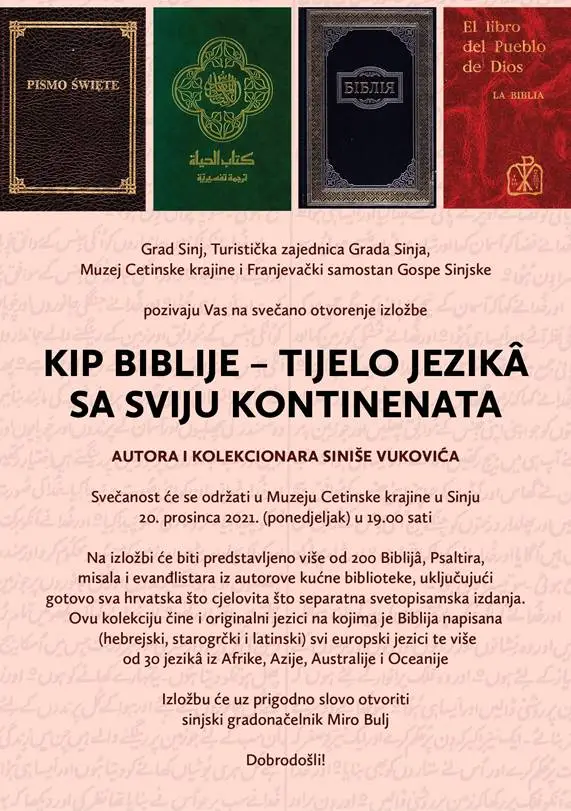In the beginning was the Word, and the Word was with God
and the Word was God.
She was in the beginning with God.
Everything became after her
and without it nothing came of it. (Jn 1: 1-4)
Another exceptional event enhances the Sinj Advent program – the exhibition Statue of the Bible – the body of languages from all continents by the writer and publicist Siniša Vuković, who has collected the Bible in different languages for 20 years. The author of the exhibition came up with the idea of collecting Bibles spontaneously when he was on a pilgrimage to Rome in 1997, where he bought a Bible in Hebrew, and theologian friends gave him a copy in Spanish. The unusual hobby has grown into a desirable and valuable collection. Siniša Vuković is the owner of almost all editions of the Bible in Croatian – among the collected Bibles are invaluable examples such as Bartol Kašić (the oldest Croatian translation of the Bible from 1630 published only in 2000) and reprint of the first published edition of the Holy Scriptures of Matija Petar Katančić from 1831. A skilled dialectologist and guardian of Brač’s heritage, Vuković even translated some parts into the peasant Chakavian language.
This exhibition brings valuable treasures of three hundred Bibles in more than 100 languages and scripts received by the author from all over the world – from the ancient languages in which the Bible was either written or transmitted: Hebrew, Ancient Greek, and Latin. Bibles from all European countries are represented, from Iceland and the Faroe Islands to Malta, Portugal to Ukraine, Turkey, Azerbaijan to Syrian Peshitta, and Persian in Urdu. Almost all European languages are represented, and several editions are in Cyrillic. In addition, bibles in unusual and exotic languages and scripts in the Philippines and Japan, China and South Korea, Thailand and Indonesia will be on display, as well as more from India, Nepal, Pakistan, Afghanistan, Iran, Georgia, Armenia, Saudi Arabia, to several African languages in Algeria and Nigeria (Yoruba, Efik, Igbo) and local languages from South Africa, Botswana, Zimbabwe, Kenya, Somalia and even the Maori Bible from New Zealand.
The exhibition’s opening is on December 20 at 7 pm at the Cetina Region Museum and can be visited until January 7, 2022. The exhibition is organized by the City of Sinj, the Sinj Tourist Board, the Franciscan Monastery of Our Lady of Sinj, and the Cetina Region Museum.
To read more about Inland Dalmatia, follow TCN’s dedicated page.









